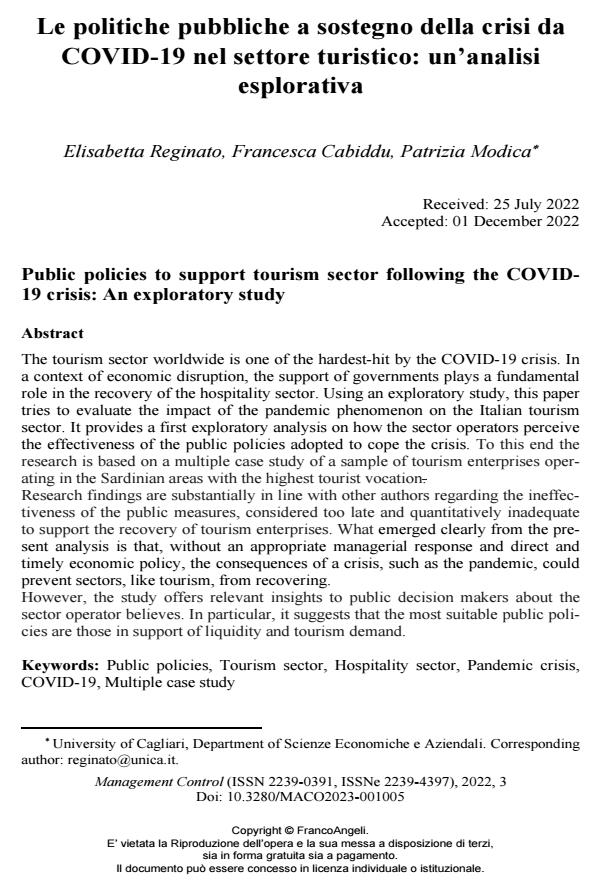Le politiche pubbliche a sostegno della crisi da COVID-19 nel settore turistico: un’analisi esplorativa
Titolo Rivista MANAGEMENT CONTROL
Autori/Curatori Elisabetta Reginato, Francesca Cabiddu, Patrizia Modica
Anno di pubblicazione 2023 Fascicolo 2023/1
Lingua Italiano Numero pagine 24 P. 95-118 Dimensione file 436 KB
DOI 10.3280/MACO2023-001005
Il DOI è il codice a barre della proprietà intellettuale: per saperne di più
clicca qui
Qui sotto puoi vedere in anteprima la prima pagina di questo articolo.
Se questo articolo ti interessa, lo puoi acquistare (e scaricare in formato pdf) seguendo le facili indicazioni per acquistare il download credit. Acquista Download Credits per scaricare questo Articolo in formato PDF

FrancoAngeli è membro della Publishers International Linking Association, Inc (PILA), associazione indipendente e non profit per facilitare (attraverso i servizi tecnologici implementati da CrossRef.org) l’accesso degli studiosi ai contenuti digitali nelle pubblicazioni professionali e scientifiche.
The tourism sector worldwide is one of the hardest-hit by the COVID-19 crisis. In a context of economic disruption, the support of governments plays a fundamental role in the recovery of the hospitality sector. Using an exploratory study, this paper tries to evaluate the impact of the pandemic phenomenon on the Italian tourism sector. It provides a first exploratory analysis on how the sector operators perceive the effectiveness of the public policies adopted to cope the crisis. To this end the research is based on a multiple case study of a sample of tourism enterprises oper-ating in the Sardinian areas with the highest tourist vocation. Research findings are substantially in line with other authors regarding the ineffec-tiveness of the public measures, considered too late and quantitatively inadequate to support the recovery of tourism enterprises. What emerged clearly from the pre-sent analysis is that, without an appropriate managerial response and direct and timely economic policy, the consequences of a crisis, such as the pandemic, could prevent sectors, like tourism, from recovering. However, the study offers relevant insights to public decision makers about the sector operator believes. In particular, it suggests that the most suitable public poli-cies are those in support of liquidity and tourism demand.
Parole chiave:Public policies, Tourism sector, Hospitality sector, Pandemic crisis, COVID-19, Multiple case study
- Seasonal work in the Italian tourism industry: a systematic literature review Fabio Gaspani, Silvia Mazzaglia, in Cambio. Rivista sulle Trasformazioni Sociali /2025 pp.17
DOI: 10.36253/cambio-16641
Elisabetta Reginato, Francesca Cabiddu, Patrizia Modica, Le politiche pubbliche a sostegno della crisi da COVID-19 nel settore turistico: un’analisi esplorativa in "MANAGEMENT CONTROL" 1/2023, pp 95-118, DOI: 10.3280/MACO2023-001005